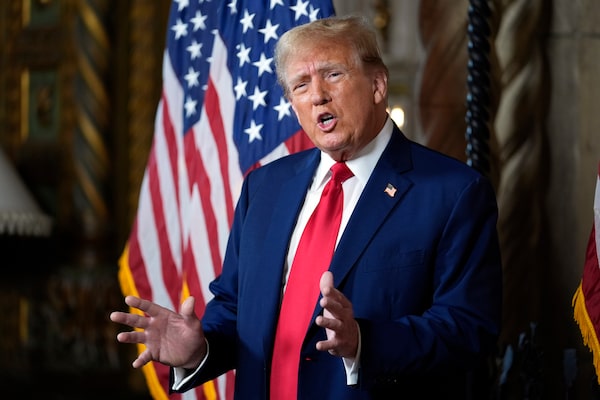
Republican presidential candidate and former President Donald Trump speaks at his Mar-a-Lago estate in Palm Beach, Fla. on March 4.Rebecca Blackwell/The Associated Press
Quebec premier Jacques Parizeau was lead author of the 1995 sovereignty referendum, so when it became clear that his side had lost, it fell to him to make a concession speech. He was given one by his speech writer. He did not read it.
Instead, at the end of a campaign that sent the emotional temperature into the stratosphere, he tried to raise it some more.
“Hey, if you don’t mind, let’s stop talking about the francophones of Quebec, can we?” he told his supporters. “Let’s talk about ‘us.’ Sixty per cent of ‘us’ voted Yes.”
And he kept going.
“It’s true that we were beaten, but in the end by what? By money and ethnic votes.”
Three decades later, that way of thinking – there’s a legitimate “us” and an illegitimate “them” – moves a lot of our politics, both left and right. Former U.S. president Donald Trump is the lead practitioner, but hardly the only one.
Back in 1995, however, the reaction to Mr. Parizeau’s speech was shock, horror and regret. His words were disowned, most importantly by his own side.
Former prime minister Brian Mulroney’s death last week got me thinking about whether, and how much, our politics has changed. In the era of social-media non-conversations, and us-versus-them polarization, are politicians still willing to lower the temperature – on their own side – instead of raising it?
Will we vote for them if they do?
In the 1995 referendum, Bloc Québécois leader Lucien Bouchard was the Yes side’s lead orator. Growing more heated as the campaign ground on, he went for federalism’s jugular, and voters’ hearts, with emotionally charged tales of Quebec’s alleged humiliation.
But once the votes were counted, Mr. Bouchard pulled back from the brink. He urged his supporters to douse their fires. Speaking before Mr. Parizeau, he said:
“Let us recognize that democracy has spoken. And democracy, we must remind ourselves tonight, is the foundation of everything. … As we all did in 1980 (the first sovereignty referendum), we must now bow before the will expressed by a majority, however small it may be, of our fellow citizens. Yes, I tell you, no matter our sadness, our first duty is thus to comport ourselves as democrats, and to accept, in calm and dignity, the decision of Quebeckers.”
A little while later, at No headquarters, some were chanting the Montreal Canadiens victory song of that era: “Na na na na, hey hey, goodbye.” They were told to cut it out before Liberal Party of Quebec leader and No campaign head Daniel Johnson Jr. took the stage. He chose to take the air out of the room with a speech about reconciliation, which was more sad than triumphant, and whose chief note was solicitude for the losing side. He said:
“I cannot help but think of the hundreds of thousands of our fellow citizens who tonight feel a deep sadness. A sadness and a disappointment that is obvious since, like us, who decided with conviction to pursue the dream of Quebec inside Canada, we can understand, and we saw moments of it during the campaign and tonight, what disappointment would await us if our dream could no longer continue. And so tonight it is toward our fellow citizens, who are seeing their dream not being realized, that we should devote all our attention: with openness, with sensibility, and with respect for their choice.”
Is this still the country we live in?
The United States has undergone a breakdown in its sense of common citizenship. In 2016, the Republican establishment rejected Mr. Trump’s extremism, just as the establishment here disowned Mr. Parizeau’s referendum speech. But Republican voters sided with Mr. Trump. Mr. Parizeau resigned; Mr. Trump’s GOP opponents have been sent packing.
We’re in a better place in Canada. But the 2022 Freedom Convoy movement, and the Trudeau government’s overcharged rhetorical response to it, at times implying that the protesters’ views were beyond the pale (as opposed to focusing solely on the blockades, which were outside the law), shows us a road that we should avoid taking.
I’m hopeful that most Canadian don’t want to go down that road.
And being hopeful, I’ll end on that note.
One of the most popular shows on Radio-Canada is the long-running satirical news show, Infoman. Each week, it takes shots at politicians. And the 2023 New Year’s Eve show – one of the most watched programs in Quebec – closed with host Jean-René Dufort telling some of the country’s leading politicians that he was going to end the year by giving them what they deserved.
A hug.
As an apt song from the group Les Cowboy Fringants played – lyrics: “How can all these people/still believe in life/in all this hypocrisy?” – he hugged Prime Minister Justin Trudeau, Quebec Premier François Legault, Environment Minister Steven Guilbeault, Manitoba Premier Wab Kinew, Conservative Leader Pierre Poilievre and others.
Then Mr. Dufort said, “I still have one hug to give. Because even when you make a mistake in life, even a big one, you have a right to a second chance.”
He went to former Speaker Anthony Rota’s office and gave him a hug.
I like that country. I’d like to continue living in it.
 Tony Keller
Tony Keller